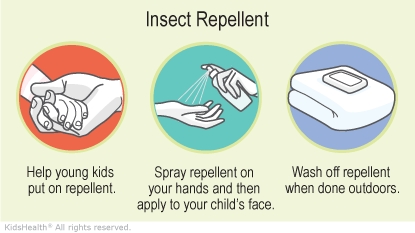Using Insect Repellents Safely
Most bug bites are harmless, but some can cause illness. Insect repellents put on clothing or skin can prevent bites from mosquitoes, ticks, fleas, biting flies, and chiggers. Here’s what to know about repellents.
What Are the Different Kinds of Insect Repellents?
Different repellents include:
- DEET prevents bites from mosquitoes, ticks, biting flies, chiggers, and fleas. In concentrations of 10%–30%, it is safe to use on children over 2 months old. The higher the concentration, the longer it lasts. Do not apply it more than once a day.
- Picaridin prevents bites from mosquitoes, ticks, and sand flies. It's available in concentrations of 5%–10% and is safe to use on children over 2 months old.
- Oil of lemon eucalyptus (made from the leaves of the lemon eucalyptus tree) prevents bites from mosquitoes, biting flies, and gnats. It can be used on kids over 3 years old and lasts up to 2 hours.
- Permethrin prevents bites from mosquitoes, flies, ticks, and chiggers. It can be sprayed on clothing and gear (such as sleeping bags) used by kids but should NOT be sprayed directly onto skin. The protection can last about a week, even if clothing is washed a few times. Don't use permethrin clothes or gear for young kids because they may suck or chew on the material.
Other products such as citronella, botanical oils, and repellent bracelets offer little to no protection from bug bites.
How Do We Use an Insect Repellent Safely?
To use repellents safely:
- Follow the directions on the repellent’s label.
- Put repellent on skin on the arms and legs not covered by clothing.
- Put repellent on the face by spraying into an adult hand and then wiping it across the child’s forehead and cheeks (away from their mouth and eyes).
- Don't put bug repellent on young children's hands because they might put them into their mouths.
- Don't put bug repellent on cut or irritated skin.
- Don't reapply the repellent unless your child gets wet or is sweating a lot.
- Wash skin with soap and water as soon as kids come back inside to remove repellent.
- Keep repellent out of the reach of children. Call Poison Control at 1-800-222-1222 or go to Poison.org if you think your child may have gotten insect repellent in their mouth or the eyes.

What Else Can Prevent Bug Bites?
To help prevent bug bites:
- Have kids wear long pants and long-sleeved shirts in the woods.
- Try to keep kids indoors or in screened-in play areas at dusk and dawn, when bugs are most active.
- Use screens on doors and windows. Repair broken or damaged screens.
- Don't give mosquitoes places to breed. They lay their eggs in water, so get rid of standing water in things like buckets, trash cans, gutters, and tires. Empty and clean birdbaths, dog bowls, and flower vases often.
- Avoid perfumes, scented body products, and brightly colored and flowered clothing because they attract bugs.
Repellents don't keep away stinging insects such as wasps, bees, and hornets. To help avoid stings, teach kids to:
- Not walk barefoot while on the grass.
- Not play in areas where stinging insects like to be, such as flower beds.
- When outside, check for stinging insects before eating food or before drinking from open soda or juice cans.
- Remain calm and quiet around stinging insects. Moving slowly, back away without any arm-waving or swatting.
- Never disturb an insect nest.
If you have any insect nests around your home, have an exterminator get rid of them.
What Else Should I Know?
Use an insect repellent approved by the EPA. Their search tool can help you choose the right one for your family.


